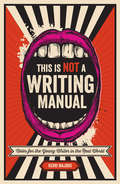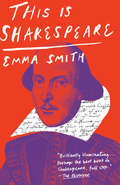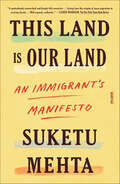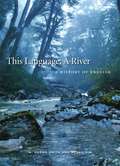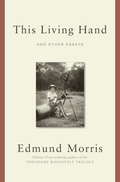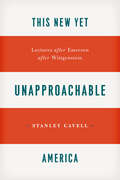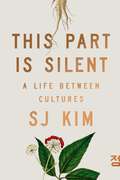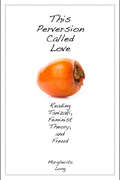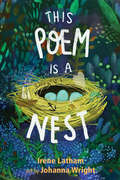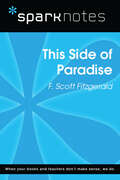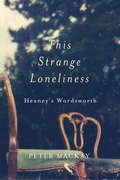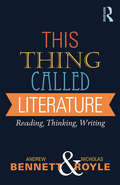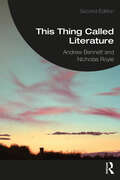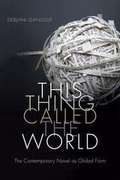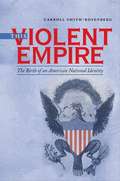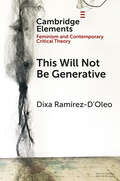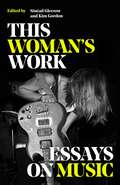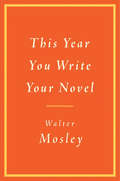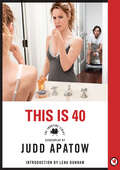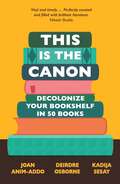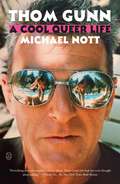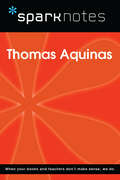- Table View
- List View
This Is Not a Writing Manual: Notes for the Young Writer in the Real World
by Kerri MajorsReal-world writing advice, minus all the lectures. You're an aspiring writer. Maybe you've just discovered your love of words and dream of being a novelist someday. Maybe you've been filling notebooks with science-fiction stories since middle school. Maybe you're contemplating a liberal arts degree, but you don't know what the heck you're going to do with it. The last thing you need is another preachy writing manual telling you how you should write. This book isn't a writing manual. It is a series of candid and irreverent essays on the writing life, from a writer who's lived it. Kerri Majors shares stories from her own life that offer insights on the realities all writers face: developing a writing voice, finding a real job (and yes, you do need to find one), taking criticism, getting published, and dealing with rejection. Don't have enough time to write? Learn how to plan your days to fit it all in. Not sure how your guilty pleasures and bad habits translate into literature? Kerri explains how soap operas and eavesdropping can actually help your writing. Need a reader for your first novel? Find a writing buddy or a writing group that will support you. Nervous about submitting your first piece? Learn from Kerri's own roller coaster journey to find an agent and get published. This Is Not a Writing Manual is the writing memoir for young writers who want to use their talents in the real world.
This Is Shakespeare
by Emma SmithAn electrifying new study that investigates the challenges of the Bard&’s inconsistencies and flaws, and focuses on revealing—not resolving—the ambiguities of the plays and their changing topicality A genius and prophet whose timeless works encapsulate the human condition like no other. A writer who surpassed his contemporaries in vision, originality, and literary mastery. A man who wrote like an angel, putting it all so much better than anyone else. Is this Shakespeare? Well, sort of. But it doesn&’t tell us the whole truth. So much of what we say about Shakespeare is either not true, or just not relevant. In This Is Shakespeare, Emma Smith—an intellectually, theatrically, and ethically exciting writer—takes us into a world of politicking and copycatting, as we watch Shakespeare emulating the blockbusters of Christopher Marlowe and Thomas Kyd (the Spielberg and Tarantino of their day), flirting with and skirting around the cutthroat issues of succession politics, religious upheaval, and technological change. Smith writes in strikingly modern ways about individual agency, privacy, politics, celebrity, and sex. Instead of offering the answers, the Shakespeare she reveals poses awkward questions, always inviting the reader to ponder ambiguities.
This Land Is Our Land: An Immigrant's Manifesto
by Suketu MehtaA 2019 NPR Staff Pick“Written ‘in sorrow and anger,’ this is a brilliant and urgently necessary book, eloquently making the case against bigotry and for all of us migrants—what we are not, who we are, and why we deserve to be welcomed, not feared.” —Salman RushdieA timely argument for why the United States and the West would benefit from accepting more immigrantsThere are few subjects in American life that prompt more discussion and controversy than immigration. But do we really understand it? In This Land Is Our Land, the renowned author Suketu Mehta attacks the issue head-on. Drawing on his own experience as an Indian-born teenager growing up in New York City and on years of reporting around the world, Mehta subjects the worldwide anti-immigrant backlash to withering scrutiny. As he explains, the West is being destroyed not by immigrants but by the fear of immigrants. Mehta juxtaposes the phony narratives of populist ideologues with the ordinary heroism of laborers, nannies, and others, from Dubai to Queens, and explains why more people are on the move today than ever before. As civil strife and climate change reshape large parts of the planet, it is little surprise that borders have become so porous. But Mehta also stresses the destructive legacies of colonialism and global inequality on large swaths of the world: When today’s immigrants are asked, “Why are you here?” they can justly respond, “We are here because you were there.” And now that they are here, as Mehta demonstrates, immigrants bring great benefits, enabling countries and communities to flourish. Impassioned, rigorous, and richly stocked with memorable stories and characters, This Land Is Our Land is a timely and necessary intervention, and a literary polemic of the highest order.
This Language, A River: A History of English
by K. Aaron Smith Susan M. KimThis Language, A River is an introduction to the history of English that recognizes multiple varieties of the language in both current and historical contexts. Developed over years of undergraduate teaching, the book helps students both to grasp traditional histories of English and to extend and complicate those histories. Exercises throughout provide opportunities for puzzling out concepts, committing terms and data to memory, and applying ideas. A comprehensive glossary and up-to-date bibliographies help to guide further study.
This Living Hand: And Other Essays
by Edmund MorrisWhen the multitalented biographer Edmund Morris (who writes with equal virtuosity about Theodore Roosevelt, Ronald Reagan, Beethoven, and Thomas Edison) was a schoolboy in colonial Kenya, one of his teachers told him, "You have the most precious gift of all--originality." That quality is abundantly evident in this selection of essays. They cover forty years in the life of a maverick intellectual who can be, at whim, astonishingly provocative, self-mockingly funny, and richly anecdotal. (The title essay, a tribute to Reagan in cognitive decline, is poignant in the extreme.) Whether Morris is analyzing images of Barack Obama or the prose style of President Clinton, or exploring the riches of the New York Public Library Dance Collection, or interviewing the novelist Nadine Gordimer, or proposing a hilarious "Diet for the Musically Obese," a continuous cross-fertilization is going on in his mind. It mixes the cultural pollens of Africa, Britain, and the United States, and propogates hybrid flowers--some fragrant, some strange, some a shock to conventional sensibilities. Repeatedly in This Living Hand, Morris celebrates the physicality of artistic labor, and laments the glass screen that today's e-devices interpose between inspiration and execution. No presidential biographer has ever had so literary a "take" on his subjects: he discerns powers of poetic perception even in the obsessively scientific Edison. Nor do most writers on music have the verbal facility to articulate, as Morris does, what it is about certain sounds that soothe the savage breast. His essay on the pathology of Beethoven's deafness breaks new ground in suggesting that tinnitus may explain some of the weird aural effects in that composer's works. Masterly monographs on the art of biography, South Africa in the last days of apartheid, the romance of the piano, and the role of imagination in nonfiction are juxtaposed with enchanting, almost unclassifiable pieces such as "The Bumstitch: Lament for a Forgotten Fruit" (Morris suspects it may have grown in the Garden of Eden); "The Anticapitalist Conspiracy: A Warning" (an assault on The Chicago Manual of Style); "Nuages Gris: Colors in Music, Literature, and Art"; and the uproarious "Which Way Does Sir Dress?", about ordering a suit from the most expensive tailor in London. Uniquely illustrated with images that the author describes as indispensable to his creative process, This Living Hand is packed with biographical insights into such famous personalities as Daniel Defoe, Henry Adams, Mark Twain, Evelyn Waugh, Truman Capote, Glenn Gould, Jasper Johns, W. G. Sebald, and Winnie the Pooh--not to mention a gallery of forgotten figures whom Morris lovingly restores to "life." Among these are the pianist Ferruccio Busoni, the poet Edwin Arlington Robinson, the novelist James Gould Cozzens, and sixteen so-called "Undistinguished Americans," contributors to an anthology of anonymous memoirs published in 1902. Reviewing that book for The New Yorker, Morris notes that even the most unlettered persons have, on occasion, "power to send forth surprise flashes, illuminating not only the dark around them but also more sophisticated shadows--for example, those cast by public figures who will not admit to private failings, or by philosophers too cerebral to state a plain truth." The author of This Living Hand is not an ordinary person, but he too sends forth surprise flashes, never more dazzlingly than in his final essay, "The Ivo Pogorelich of Presidential Biography."
This New Yet Unapproachable America: Lectures after Emerson after Wittgenstein (Frederick Ives Carpenter Lectures; Ser.)
by Stanley CavellStanley Cavell is a titan of the academic world; his work in aesthetics and philosophy has shaped both fields in the United States over the past forty years. In this brief yet enlightening collection of lectures, Cavell investigates the work of two of his most tried-and-true subjects: Emerson and Wittgenstein. Beginning with an introductory essay that places his own work in a philosophical and historical context, Cavell guides his reader through his thought process when composing and editing his lectures while making larger claims about the influence of institutions on philosophers, and the idea of progress within the discipline of philosophy. In “Declining Decline,” Cavell explains how language modifies human existence, looking specifically at the culture of Wittgenstein’s writings. He draws on Emerson, Thoreau, and many others to make his case that Wittgenstein can indeed be viewed as a “philosopher of culture.” In his final lecture, “Finding as Founding,” Cavell writes in response to Emerson’s “Experience,” and explores the tension between the philosopher and language—that he or she must embrace language as his or her “form of life,” while at the same time surpassing its restrictions. He compares finding new ideas to discovering a previously unknown land in an essay that unabashedly celebrates the power and joy of philosophical thought.
This Part Is Silent: A Life Between Cultures
by SJ KimA searing essay collection that explores displacement and loss, creativity and change, institutional power and progress. Born in Korea, raised in the American South, and trying her best to survive British academia, SJ Kim probes her experiences as a writer, a scholar, and a daughter to confront the silences she finds in the world. With curiosity and sensitivity, she writes letters to the institutions that simultaneously support and fail her, intimate accounts of immigration, and interrogations of rising anti-Black and anti-Asian racism. She considers the silences between generations—especially within the Asian diaspora in the West—as she finds her way back to her own family during the pandemic lockdown. Embracing the possibilities and impossibilities of language, Kim rejoices in the similes of Korean, her mother tongue, and draws inspiration from K-dramas and writers across cultures who sustain her. As borders close in and nations enter lockdown, the journey that Kim traces is fraught—and at once illuminates that the act of remaining present has its own power, allowing boundless hope.
This Perversion Called Love
by Margherita LongLong (comparative literature and foreign languages, U. of California, Riverside) considers sexual perversion in Tanizaki Jun'ichiro's aesthetic essays, cultural criticism, cinema writings, and short novels from the 1930s, intersections with psychoanalysis, and what this means from a feminist perspective. She contends that Tanizaki sees human subjectivity in the same way as Freud, but that he is more critical than Freud about the possibility of love, that such love is impossible in a monosexual perspective. Using a feminist approach, she provides a psychoanalytic look at the intellectual climate of 1930s Japan and Tanazaki's essays within this context; outlines parallels with Freud's ideas of masochism; analyzes Tanazaki's novels in terms of feminist ideas; and discusses his contribution to the feminist debate on maternity, and parallels to feminist film theory in his cinema essays, especially how in feminist film theory, cinema equates women with absence. Annotation c2010 Book News, Inc. , Portland, OR (booknews. com)
This Poem is a Nest
by Irene LathamA Kirkus Reviews Best BookAn NCTE Notable Poetry BookThis beautiful poetry collection introduces readers to the art of found poetry as the poet writes a 37-line poem, "Nest," then finds 160 smaller poems within it.What can you find in a poem about a robin's nest? Irene Latham masterfully discovers "nestlings" or smaller poems about an astonishing variety of subjects--emotions, wild animals, natural landmarks on all seven continents, even planets and constellations. Each poem is a glorious spark of wonder that will prompt readers to look at the world afresh. The book includes an introduction detailing the principles of found poetry and blackout poetry, and a section of tips at the end. The joyous creativity in this volume is certain to inspire budding poets.
This Side of Paradise (SparkNotes Literature Guide Series)
by SparkNotesThis Side of Paradise (SparkNotes Literature Guide) by F. Scott Fitzgerald Making the reading experience fun! Created by Harvard students for students everywhere, SparkNotes is a new breed of study guide: smarter, better, faster. Geared to what today's students need to know, SparkNotes provides: *Chapter-by-chapter analysis *Explanations of key themes, motifs, and symbols *A review quiz and essay topicsLively and accessible, these guides are perfect for late-night studying and writing papers
This Strange Loneliness: Heaney's Wordsworth
by Peter MackayThis Strange Loneliness is the first comprehensive account of the poetic relationship between Seamus Heaney and William Wordsworth. Peter Mackay explores how Heaney repeatedly turns to the Romantic poet's work for inspiration, corroboration, and amplification, and as a model for the fortifying power of poetry itself, which offers the fundamental lesson that "it is on this earth 'we find our happiness, or not at all.'"Through an in-depth look at archival materials, and at uncollected poems and prose by Heaney, Mackay traces the evolution of Heaney's readings of Wordsworth throughout his career, revealing their shared interest in the connections between poetry and education, the possibility of a beneficial understanding of poetic influence, the complexities of place and displacement, ideas of transcendence, and ultimately the importance of "late style": later poems by Wordsworth might prove a cautionary tale, as well as example, for any poet. Placing Heaney's readings within their political, historical, and poetic contexts the book also explores how he negotiated the complex relationship between Irish and British culture and identity to claim a persistent form of kinship, and forge a strange community, with the Romantic poet.With illuminating readings that reveal new contexts to and currents in Heaney's work, This Strange Loneliness is a powerful evocation of the Irish poet's sense of the "uplift" that poetry can provide.
This Thing Called Literature: Reading, Thinking, Writing
by Andrew Bennett Nicholas RoyleWhat is this thing called literature? Why should we study it? And how? Relating literature to topics such as dreams, politics, life, death, the ordinary and the uncanny, this beautifully written book establishes a sense of why and how literature is an exciting and rewarding subject to study. Bennett and Royle delicately weave an essential love of literature into an account of what literary texts do, how they work and what sort of questions and ideas they provoke. The book's three parts reflect the fundamental components of studying literature: reading, thinking and writing. The authors use helpful, familiar examples throughout, offering rich reflections on the question 'What is literature?' and on what they term 'creative reading'. Bennett and Royle's lucid and friendly style encourages a deep engagement with literary texts. This book is not only an essential guide to the study of literature, but an eloquent defence of the discipline.
This Thing Called Literature: Reading, Thinking, Writing
by Andrew Bennett Nicholas RoyleWhat is this thing called literature? Why study it? And how? Relating literature to topics such as dreams, politics, life, death, the ordinary and the uncanny, This Thing Called Literature establishes a sense of why and how literature is an exciting and rewarding subject to study. Andrew Bennett and Nicholas Royle expertly weave an essential love of literature into an account of what literary texts do, how they work and the sort of questions and ideas they provoke. The book’s three parts reflect the fundamental components of studying literature: reading, thinking and writing. The authors use helpful and wide-ranging examples and summaries, offering rich reflections on the question ‘What is literature?’ and on what they term ‘creative reading’. The new edition has been revised throughout with extensive updates to the further reading and a new chapter on creative non-fiction. Bennett and Royle’s accessible and thought-provoking style encourages a deep engagement with literary texts. This essential guide to the study of literature is an eloquent celebration of the value and pleasure of reading.
This Thing Called the World: The Contemporary Novel as Global Form
by Debjani GangulyIn This Thing Called the World Debjani Ganguly theorizes the contemporary global novel and the social and historical conditions that shaped it. Ganguly contends that global literature coalesced into its current form in 1989, an event marked by the convergence of three major trends: the consolidation of the information age, the arrival of a perpetual state of global war, and the expanding focus on humanitarianism. Ganguly analyzes a trove of novels from authors including Salman Rushdie, Don DeLillo, Michael Ondaatje, and Art Spiegelman, who address wars in Iraq, Afghanistan, and Sri Lanka, the Palestinian and Kashmiri crises, the Rwandan genocide, and post9/11 terrorism. These novels exist in a context in which suffering's presence in everyday life is mediated through digital images and where authors integrate visual forms into their storytelling. In showing how the evolution of the contemporary global novel is analogous to the European novel's emergence in the eighteenth century, when society and the development of capitalism faced similar monumental ruptures, Ganguly provides both a theory of the contemporary moment and a reminder of the novel's power.
This Violent Empire
by Carroll Smith-RosenbergThis Violent Empiretraces the origins of American violence, racism, and paranoia to the founding moments of the new nation and the initial instability of Americans' national sense of self. Fusing cultural and political analyses to create a new form of political history, Carroll Smith-Rosenberg explores the ways the founding generation, lacking a common history, governmental infrastructures, and shared culture, solidified their national sense of self by imagining a series of "Others" (African Americans, Native Americans, women, the propertyless) whose differences from European American male founders overshadowed the differences that divided those founders. These "Others," dangerous and polluting, had to be excluded from the European American body politic. Feared, but also desired, they refused to be marginalized, incurring increasingly enraged enactments of their political and social exclusion that shaped our long history of racism, xenophobia, and sexism. Close readings of political rhetoric during the Constitutional debates reveal the genesis of this long history. This Violent Empiretraces the origins of American violence, racism, and paranoia to the founding moments of the new nation and the initial instability of Americans' national sense of self. Fusing cultural and political analyses to create a new form of political history, Carroll Smith-Rosenberg explores the ways the founding generation, lacking a common history, governmental infrastructures, and shared culture, solidified their national sense of self by imagining a series of "Others" (African Americans, Native Americans, women, the propertyless) whose differences from European American male founders overshadowed the differences that divided those founders. These "Others," dangerous and polluting, had to be excluded from the European American body politic. Feared, but also desired, they refused to be marginalized, incurring increasingly enraged enactments of their political and social exclusion that shaped our long history of racism, xenophobia, and sexism. Close readings of political rhetoric during the Constitutional debates reveal the genesis of this long history.
This Will Not Be Generative (Elements in Feminism and Contemporary Critical Theory)
by Dixa Ramírez-D'OleoThis Will Not Be Generative attends to the semiotics of ecological writings via Caribbean literary studies and black critical theory. Closely reading texts by Donna Haraway, Monique Allewaert, and Lisa Wells, it exposes how the language of tentacles and tendrils, an assumptive 'we,' and redemptive sympathy or 'care' disguises extraction from black people and blackness. This often speculative rhetoric, abetted by fantasies of white communion with indigenous groups, contrasts with the horror semiotics of the films Get Out (2017) and Midsommar (2019), which unmask the antagonistic relationship between white survival 'at the end of the world' and blackness as compost.
This Woman's Work: Essays on Music
by VariousThis Woman's Work: Essays on Music is edited by Kim Gordon and Sinéad Gleeson and features contributors Anne Enright, Fatima Bhutto, Jenn Pelly, Rachel Kushner, Juliana Huxtable, Leslie Jamison, Liz Pelly, Maggie Nelson, Margo Jefferson, Megan Jasper, Ottessa Moshfegh, Simone White, Yiyun Li and Zakia Sewell.Published to challenge the historic narrative of music and music writing being written by men, for men, This Woman's Work seeks to confront the male dominance and sexism that have been hard-coded in the canons of music, literature, and film and has forced women to fight pigeon-holing or being side-lined by carving out their own space. Women have to speak up, to shout louder to tell their story - like the auteurs and ground-breakers featured in this collection, including: Anne Enright on Laurie Anderson; Megan Jasper on her ground-breaking work with Sub Pop; Margo Jefferson on Bud Powell and Ella Fitzgerald; and Fatima Bhutto on music and dictatorship.This Woman's Work also features writing on the experimentalists, women who blended music and activism, the genre-breakers, the vocal auteurs; stories of lost homelands and friends; of propaganda and dictatorships, the women of folk and country, the racialised tropes of jazz, the music of Trap and Carriacou; of mixtapes and violin lessons.
This Year You Write Your Novel
by Walter MosleyNo more excuses. "Let the lawn get shaggy and the paint peel from the walls," bestselling novelist Walter Mosley advises. Anyone can write a novel now, and in this essential book of tips, practical advice, and wisdom, Walter Mosley promises that the writer-in-waiting can finish it in one year. Intended as both inspiration and instruction, the book provides the tools to turn out a first draft painlessly and then revise it into something finer. Mosley tells how to: *Create a daily writing regimen to fit any writer's needs--and how to stick to it. *Determine the narrative voice that's right for every writer's style. *Get past those first challenging sentences and into the heart of a story.
This is 40: The Shooting Script (Shooting Script)
by Judd ApatowFive years after Judd Apatow introduced us to Pete and Debbie in Knocked Up, Paul Rudd and Leslie Mann reprise their roles as the couple in the writer/director's This Is 40, a comedic look at the everyday life of an American family. What emerges is a portrait of the challenges and rewards of marriage and parenthood: sex and romance, career triumphs and financial hardships, aging parents and maturing children and everything in between. This Is 40 captures what it takes for a family to flourish in the middle of a lifetime together, rendered with the unique intimacy of a filmmaker collaborating with his own wife and children.The Newmarket Shooting Script Book includes: An introduction by writer/actor Lena Dunham written especially for this edition Judd Apatow's answers to "Five Obvious Questions" and an afterword on his writing/directing process The complete screenplay 35 color photographs Complete cast and crew credits
This is Writing: A Conceptual Guide to College Composition (Third Edition)
by J. D. IsipMany people consider writing to be a skill. A skill is something you can learn and perform. A skill can also be improved upon. If we think of writing, we might reflect on our own learning of words--how to put the letters together to form them. Then, of course, we would string those words into sentences and the sentences into paragraphs. In this way, one certainly would not argue against the concept of writing as a skill to be learned and improved upon. In "This is Writing: A Conceptual Guide to College Composition", J. D. Isip explains how thinking of a subject conceptually is to hold it out in front of you and evaluate it from several different angles, to apply multiple mental lenses and filters, and to draw conclusions and evaluate those conclusions.
This is the Canon: Decolonize Your Bookshelves in 50 Books
by Deirdre Osborne Joan Anim-Addo Kadija Sesay George'A vital and timely introduction to some of the best books I've ever read. Perfectly curated and filled with brilliant literature'Nikesh Shukla'The ultimate introduction to post-colonial literature for those who want to understand the classics and the pioneers in this exciting area of books'Symeon BrownThese are the books you should read. This is the canon.Joan Anim-Addo, Deirdre Osborne and Kadija Sesay have curated a decolonized reading list that celebrates the wide and diverse experiences of people from around the world, of all backgrounds and all races. It disrupts the all-too-often white-dominated 'required reading' collections that have become the accepted norm and highlights powerful voices and cultural perspectives that demand a place on our shelves. From literary giants such as Toni Morrison and Chinua Achebe to less well known (but equally vital) writers such as Caribbean novelist Earl Lovelace or Indigenous Australian author Tony Birch, the novels recommended here are in turn haunting and lyrical; innovative and inspiring; edgy and poignant.The power of great fiction is that readers have the opportunity to discover new worlds and encounter other beliefs and opinions. This is the Canon offers a rich and multifaceted perspective on our past, present and future which deserves to be read by all bibliophiles - whether they are book club members or solitary readers, self-educators or teachers.
This is the Canon: Decolonize Your Bookshelves in 50 Books
by Deirdre Osborne Joan Anim-Addo Kadija Sesay George'A vital and timely introduction to some of the best books I've ever read. Perfectly curated and filled with brilliant literature'Nikesh Shukla'The ultimate introduction to post-colonial literature for those who want to understand the classics and the pioneers in this exciting area of books'Symeon BrownThese are the books you should read. This is the canon.Joan Anim-Addo, Deirdre Osborne and Kadija Sesay have curated a decolonized reading list that celebrates the wide and diverse experiences of people from around the world, of all backgrounds and all races. It disrupts the all-too-often white-dominated 'required reading' collections that have become the accepted norm and highlights powerful voices and cultural perspectives that demand a place on our shelves. From literary giants such as Toni Morrison and Chinua Achebe to less well known (but equally vital) writers such as Caribbean novelist Earl Lovelace or Indigenous Australian author Tony Birch, the novels recommended here are in turn haunting and lyrical; innovative and inspiring; edgy and poignant.The power of great fiction is that readers have the opportunity to discover new worlds and encounter other beliefs and opinions. This is the Canon offers a rich and multifaceted perspective on our past, present and future which deserves to be read by all bibliophiles - whether they are book club members or solitary readers, self-educators or teachers.
Tholkappiyam Ezhuthathikaram Ilampooranam: தொல்காப்பியம் எழுத்ததிகாரம் இளம்பூரணம்
by Directorate of Distance Education Alagappa University Karaikudiஇந்த ஆவணம் தொல்காப்பியம் - எழுத்ததிகாரம் பற்றிய முழுமையான ஆய்வுக் கையேடாகும், இது டாக்டர் எம். சிதம்பரத்தின் உரையுடன் வடிவமைக்கப்பட்டுள்ளது. தமிழின் இலக்கணக் கொள்கைகளை விளக்குவதில் இது முக்கியமானதாக உள்ளது, குறிப்பாக எழுத்துக்கள் மற்றும் ஒலிகளின் தோற்றம், செயல்பாடு மற்றும் மாற்றங்களைப் பற்றியும், அவற்றின் சொற்கள் மற்றும் வாக்கியங்களை அமைப்பதில் காணப்படும் பயன்பாடுகளையும் விவரிக்கிறது. இதில் மொழிமரபுகள், ஒலியியல், உருபியல் மற்றும் சொல்லமைப்பு ஆகிய பிரிவுகள் அடங்கியுள்ளன. தமிழின் அமைப்பு மற்றும் ஒலியியல் விதிகளின் நுட்பங்களை விளக்குவதோடு, மொழியின் கலாசார மற்றும் வரலாற்றுச் சிறப்பையும் அலசுகிறது. தொலைநிலைக் கல்வி இயக்கம் மூலம் வழங்கப்படும் எம்.ஏ. தமிழ் பாடத்திட்டத்தின் ஒரு பகுதியாக, இந்த கையேடு தமிழின் இலக்கண வளங்களை ஆராய, பகுப்பாய்வு திறன்களை மேம்படுத்த மற்றும் தமிழின் இலக்கணச் செழுமையைப் பற்றிய ஆழ்ந்த புரிதலை உருவாக்க வடிவமைக்கப்பட்டுள்ளது.
Thom Gunn: A Cool Queer Life
by Michael NottA no-holds-barred biography of the great poet and sexual rebel, who could “give the dead a voice, make them sing” (Hilton Als, The New Yorker). Thom Gunn was not a confessional poet, and he withheld much, but inseparable from his rigorous, formal poetry was a ravenous, acute experience of life and death. Raised in Kent, England, and educated at Cambridge, Gunn found a home in San Francisco, where he documented the city’s queerness, the hippie mentality (and drug use) of the sixties, and the tragedy and catastrophic impact of the AIDS crisis in the eighties and beyond. As Jeremy Lybarger wrote in The New Republic, the author of Moly and The Man with Night Sweats was “an agile poet who renovated tradition to accommodate the rude litter of modernity.” Thom Gunn: A Cool Queer Life chronicles, for the first time, the largely undocumented life of this revolutionary poet. Michael Nott, a coeditor of The Letters of Thom Gunn, draws on letters, diaries, notebooks, interviews, and Gunn’s poetry to create a portrait as vital as the man himself. Nott writes with insight and intimacy about the great sweep of Gunn’s life: his traditional childhood in England; his mother’s suicide; the mind-opening education he received at Cambridge, reading Shakespeare and John Donne; his decades in San Francisco and with his life partner, Mike Kitay; and his visceral experience of sex, drugs, and loss. Thom Gunn: A Cool Queer Life is a long-awaited, landmark study of one of England and America’s most innovative poets.
Thomas Aquinas (SparkNotes Philosophy Guide)
by SparkNotesThomas Aquinas (SparkNotes Philosophy Guide) Making the reading experience fun! SparkNotes Philosophy Guides are one-stop guides to the great works of philosophy–masterpieces that stand at the foundations of Western thought. Inside each Philosophy Guide you&’ll find insightful overviews of great philosophical works of the Western world.
